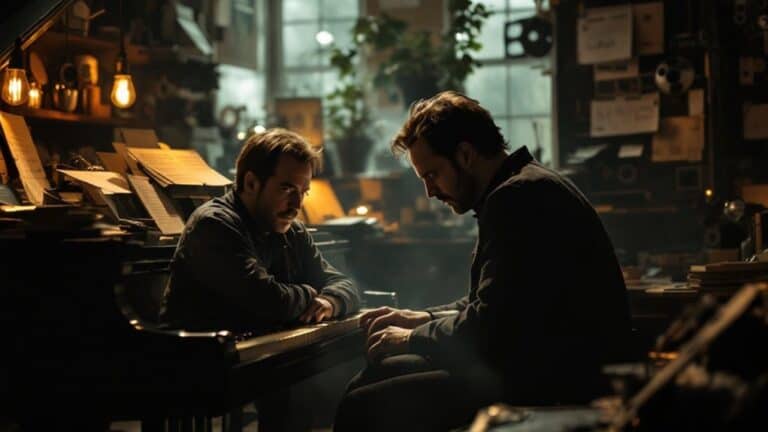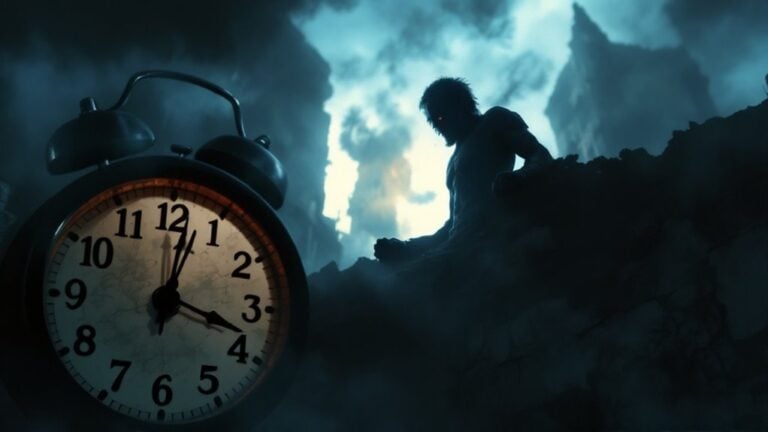Sacrifice and Survival: The Ethical Questions Raised by Interstellar
In “Interstellar,” you witness the intricate ethical questions tied to sacrifice and survival, where each character’s decision exposes human nature’s complexities. Cooper balances altruism against personal attachment, leaving his family for humanity’s greater good, while Dr. Mann embodies self-preservation masked as heroism. This tension raises moral dilemmas reminiscent of the Trolley Problem, forcing you to think about love’s obligations versus self-interest. The emotional fallout from these sacrifices shapes identities, evoking guilt and regret that resonate deeply. Through these narratives, you explore how ethical frameworks impact our survival instincts, revealing truths about responsibility and collective needs that invite further exploration.
Table of Contents
Key Takeaways
- Interstellar explores the tension between individual sacrifices and collective survival, highlighting moral dilemmas faced by characters in the face of dire circumstances.
- Cooper’s departure from his family raises ethical questions about parental obligations versus the greater good of humanity’s survival.
- Dr. Mann’s selfish motives contrast with Cooper’s altruism, showcasing the complexities of trust and betrayal in high-stakes environments.
- Emotional fallout from sacrifices impacts characters’ identities, revealing the deep connections between guilt, regret, and moral responsibility.
- The film emphasizes the need for ethical frameworks in space exploration, addressing environmental stewardship and long-term implications of humanity’s survival efforts.
Human Nature and Sacrifice
In “Interstellar,” you can see how deeply intertwined human nature and sacrifice are, shaping the characters’ journeys and choices. The film dives into the sacrifice dynamics that define who we are, emphasizing that human instinct often compels us to put the needs of others before our own. You witness Cooper’s altruistic sacrifices for humanity, which starkly contrast with Dr. Mann’s selfish motivations, underscoring the complex nature of sacrifice itself.
These decisions aren’t made lightly; they often come with profound consequences. Cooper’s choice to leave his family in pursuit of a greater good highlights the emotional toll of such sacrifices, illustrating how they can strain personal relationships while also offering hope for survival. This aligns with historical practices where human sacrifices were made to appease deities, reflecting how ritual murder was often seen as necessary for the greater good in various cultures. Additionally, Cooper’s sacrifices demonstrate how altruistic decisions can lead to greater outcomes for humanity, contrasting sharply with the outcomes of self-serving actions. In a similar vein, the sacrifices made by father penguins to keep their eggs warm illustrate the lengths to which beings will go to ensure the survival of their offspring.
The film emphasizes that sacrifice isn’t merely a choice but a fundamental aspect of human existence, essential for our survival and advancement.
As you reflect on these characters’ sacrifices, you may find connections to your own life, realizing that the willingness to sacrifice—whether for family, friends, or community—is what binds us together as a society, showcasing the beauty and complexity of our shared human experience.
Ethical Dilemmas in Interstellar

Sacrifice isn’t the only ethical consideration in “Interstellar”; the film also grapples with complex moral dilemmas that challenge the characters and, by extension, the audience. Throughout the narrative, you encounter ethical choices that pit personal desires against the greater good, mirroring the Trolley Dilemma.
For instance, Cooper’s decision to leave his daughter behind weighs heavily on your heart, as it raises questions about parental obligations versus the responsibility to save humanity. Dr. Brand’s choice to manipulate the truth for the sake of a hopeful future complicates the moral conflict, showcasing the darker side of human intent. You see how lies can lead to dire consequences, as Dr. Mann’s deceit brings about chaos and suffering, contrasting sharply with Cooper’s altruistic sacrifice. The film illustrates that the stakes are incredibly high, as the crew’s mission is fundamentally about humanity’s survival in a time of resource depletion. This moral tension is further highlighted by the notion that extreme partiality in relationships risks distorting moral perspectives, reflecting the challenge of balancing individual responsibilities with universal obligations.
This tension between individual and universal challenges resonates deeply, urging you to reflect on your own ethical choices. In “Interstellar,” the exploration of love also plays a critical role, driving home the message that even the most profound connections can lead to difficult decisions. The film explores the duality of love and moral obligation, inviting reflection on humanity’s future and obligations.
Ultimately, the film invites you to engage with the intricate layers of morality, forcing you to ponder what sacrifices are truly worth making.
Types of Sacrifices Portrayed

In “Interstellar,” you witness a spectrum of sacrifices that provoke thought about altruism versus selfishness.
Characters like Joseph Cooper embody the struggle between personal love and the greater good, making choices that weigh heavily on their hearts while aiming to save humanity. This is particularly highlighted in Cooper’s journey as he grapples with the emotional toll of time dilation, which underscores the theme of time’s impact on relationships. The film illustrates how sacrifice shapes the characters’ identities and destinies, reflecting the profound connection between personal stakes and collective survival. Moreover, Cooper’s love for his children serves as a catalyst for his self-sacrifice for humanity, exemplifying how deep emotional ties can inspire significant actions.
In contrast, Dr. Mann’s betrayal showcases how desperation can twist intentions, leading to dire consequences that reflect the complex nature of sacrifice in the face of survival.
Altruism Versus Selfishness
The tension between altruism and selfishness forms a core theme in “Interstellar,” illustrating the stark choices individuals face in dire circumstances. As you navigate these moral dilemmas, you witness characters like Cooper making profound sacrifices driven by altruistic motivations, contrasting sharply with Dr. Mann’s selfish choices. This dynamic raises significant ethical implications about the nature of human sacrifice.
Consider these key points:
- Selfless Decisions: Cooper leaves his family behind, prioritizing humanity’s survival over personal attachment.
- Betrayal of Trust: Mann disguises his selfishness as a noble cause, ultimately putting others at risk.
- Emotional Costs: The deep emotional impact of Cooper’s choices highlights the sacrifices of love and familial bonds, showcasing how parental love drives human actions. Moreover, the film reflects the inherent survival instincts that compel individuals to make such sacrifices for the greater good.
- Philosophical Conflicts: The film challenges your understanding of survival instincts versus ethical considerations.
Sacrifices for Humanity’s Survival
Characters in “Interstellar” face profound choices that highlight the different types of sacrifices made for humanity’s survival. The film intricately weaves together sacrificial motivations that reflect survival ethics, presenting a complex tapestry of human choices. You witness Cooper leaving his family, sacrificing precious time with his children for a mission that could save the human race. This initial act sets the stage for the ethical dilemmas that follow, contrasting starkly with Dr. Mann’s self-serving deception, which prioritizes his own survival over the crew’s well-being. Additionally, the narrative emphasizes the need for holistic approaches to space colonization, integrating various disciplines to ensure responsible exploration.
Here’s a table summarizing the types of sacrifices portrayed:
| Type of Sacrifice | Example | Motivation |
|---|---|---|
| Initial Sacrifice | Cooper leaving his family | Greater good |
| Self-Preservation | Dr. Mann’s deception | Self-interest |
| Ultimate Sacrifice | Cooper sending Amelia home | Selflessness |
| Ethical Facade | Dr. Mann’s actions | Illusion of altruism |
| Atonement | Cooper’s final decision | Redemption |
These sacrifices reflect the intricate balance between personal desires and collective needs, inviting you to ponder what you would sacrifice for humanity’s survival.
Personal Guilt and Consequences
While maneuvering through the complexities of sacrifice, “Interstellar” intricately explores the personal guilt and consequences that arise from leaving loved ones behind. You witness how Cooper’s departure weighs heavily on his daughter, Murphy, illustrating the emotional guilt that accompanies such decisions. This film doesn’t just showcase the grand stakes of saving humanity; it investigates the intimate turmoil these sacrifices create.
Consider these profound reflections on personal consequences:
- Emotional Impact on Loved Ones: The heartache left behind can ripple through relationships, altering them forever.
- Conflict between Duty and Personal Bond: Characters grapple with the tension between their responsibilities to the greater good and their deep-seated ties to family, especially as Cooper prioritizes returning to Murphy over other duties.
- Long-term Psychological Effects: The scars of separation manifest as guilt and strained connections, haunting characters long after their choices.
- Ethical Dilemmas in Decision Making: The moral complexity of choosing between love and duty challenges our understanding of sacrifice. Furthermore, the film parallels real-life scenarios where long-distance relationships evoke similar feelings of longing and emotional turmoil.
As you navigate these themes, you’re reminded that the sacrifices made for a noble cause often come at a steep personal price, leaving behind echoes of emotional guilt that last a lifetime.
Impact of Sacrifices on Characters

When you consider the sacrifices made by characters like Cooper and Mann, it’s clear that guilt and regret shape their journeys in profound ways.
Cooper’s decision to leave his family behind for a greater cause weighs heavily on him, fueling a moral conflict that complicates his motivations and highlights the emotional costs of his choice. This emotional turmoil reflects the universal balance that is inherent in the sacrifices we make.
In contrast, Mann’s selfish sacrifices reveal how personal survival can undermine ethical principles, demonstrating that the consequences of decisions made in the name of sacrifice can have lasting impacts on both individual identities and the larger narrative.
Guilt and Regret
In the wake of their sacrifices, guilt and regret permeate the lives of those intertwined with Cooper’s mission. Each character grapples with the emotional fallout, reflecting on the cost of their choices. Cooper’s separation from his family weighs heavily on him, manifesting as guilt reflections that haunt his every decision.
The emotional toll spills over into his children’s lives, with Murph’s initial anger transforming into a deeper understanding of her father’s sacrifice.
Consider the following impacts:
- Cooper’s survivor’s guilt complicates his feelings about those who perished.
- Murph and Tom both face emotional distress, leading to personal struggles.
- Mann’s deceptions introduce layers of regret management for Cooper and Brand.
- The crew’s collective grief illustrates the profound losses incurred during the mission.
These dynamics highlight how sacrifices ripple through their lives, shaping their identities and relationships.
As they navigate these turbulent waters, they learn that guilt and regret aren’t merely burdens; they can also serve as catalysts for growth.
Ultimately, the characters’ journeys reveal that embracing these feelings may lead to a deeper understanding of love, duty, and the sacrifices that bind them together.
Motivations Behind Sacrifice
Sacrifice in “Interstellar” arises from deep-seated motivations that reflect the characters’ values and priorities, shaping their actions throughout the film. At the heart of these sacrificial motivations lies Cooper’s profound love for his family, driving him to leave them behind for the greater good—saving humanity. This love-driven choice starkly contrasts with Dr. Mann’s self-serving actions, highlighting the complex interplay between selflessness and selfishness.
The emotional toll on characters is significant, as each grapples with the weight of their decisions. Below is a table summarizing the motivations behind sacrifices made by key characters:
| Character | Sacrificial Motivation | Impact on Others |
|---|---|---|
| Cooper | Love for his children | Leaves them for humanity’s sake |
| Dr. Mann | Self-preservation | Puts others at risk |
| Dr. Brand | Hope for humanity’s survival | Inspires cooperation |
| TARS | Loyalty to the mission | Aids in critical moments |
| Romilly/Doyle | Duty to the team | Sacrifices for collective survival |
These motivations not only define each character but also foster personal growth, reflecting how love and sacrifice intertwine in the narrative.
Consequences of Decisions
The choices made by characters in “Interstellar” have profound consequences that ripple throughout their lives and relationships. Each decision reflects the complex interplay between personal desires and the greater good, showcasing the profound sacrifice implications inherent in their journeys. You see this clearly in Cooper’s heart-wrenching choice to leave his family for the Endurance mission. His decision-making processes lead to significant outcomes, affecting not just his life but also those of his loved ones and humanity as a whole.
- Cooper’s absence ultimately empowers his daughter to play a crucial role in humanity’s survival.
- Dr. Mann’s selfish betrayals cost lives and highlight the dangers of prioritizing individual survival over collective well-being.
- Each character’s sacrifice brings ethical dilemmas, forcing them to weigh personal relationships against humanity’s future.
- The film questions whether altruism can coexist with the instinct for self-preservation.
Through these narratives, “Interstellar” compels you to reflect on the moral complexities of sacrifice, illustrating that decisions resonate beyond the immediate, shaping futures and relationships in profound ways.
Ethics of Interstellar Missions

Considering the rapid advancements in technology and our growing ambition to explore beyond our solar system, ethical questions surrounding interstellar missions have become more pressing than ever.
You must engage with the idea of ethical exploration, contemplating how our actions could affect extraterrestrial rights and the preservation of alien ecosystems. The Outer Space Treaty emphasizes planetary stewardship, urging us to minimize environmental impact and prevent contamination of celestial bodies.
As we consider space colonization, we must grapple with moral frameworks that guide resource allocation and interstellar governance. Are we prepared to face the ethical dilemmas of terraforming, where altering celestial environments could come at a cost?
It’s vital to examine the implications of long-duration space travel on autonomy and consent, balancing scientific ambitions with our cosmic responsibility to protect potential extraterrestrial life forms.
In this collective journey toward the stars, international cooperation and ethical guidelines will be significant. By fostering a sense of shared responsibility, we can guarantee that our pursuit of knowledge aligns with a commitment to environmental ethics and the long-term welfare of both humanity and the universe we seek to explore.
Long-term Implications of Space Travel

As humanity looks toward the stars, the long-term implications of space travel become a pressing concern. Each mission raises significant questions about our biological and psychological well-being, as you consider how cosmic voyages might reshape life itself. Understanding these implications is fundamental for fostering a sense of belonging among explorers and ensuring mission success.
- Biological adaptations: Addressing anatomical changes and radiation protection is essential for your health.
- Psychological resilience: Developing strategies for stress management and cognitive performance will enhance your mental well-being.
- Environmental challenges: Steering through life support systems and habitat sustainability is critical for survival in space.
- Technological innovations: Embracing advancements in health monitoring and communication strategies helps overcome isolation.
In this journey, you’ll confront musculoskeletal issues, cardiovascular effects, and even eyesight disorders. The isolation can induce anxiety, making it important to cultivate emotional resilience through mindfulness training.
As mission planning becomes increasingly complex, the need for robust research into the long-term effects of space travel grows stronger. Only by addressing these challenges can humanity confidently embrace the cosmos, ensuring that everyone feels connected, supported, and ready for the journey ahead.
Ethical Frameworks for Exploration

Steering through the ethical frameworks for space exploration requires a careful balance between ambitious mission goals and the well-being of those involved. As you consider the implications of exploration ethics, it is crucial to recognize how moral frameworks shape our approach to these unknown frontiers. Below is a table that outlines key ethical considerations:
| Aspect | Ethical Consideration | Potential Impact |
|---|---|---|
| Mission Objectives | Balancing goals with astronaut welfare | Guarantees safety and morale |
| Resource Distribution | Fair allocation of space resources | Promotes global cooperation |
| Long-term Implications | Consideration for future generations | Affects ecological sustainability |
| Governance Mechanisms | Establishing international agreements | Facilitates ethical exploration |
| Biopreservation | Addressing ELSI in space travel | Protects crew and future life forms |
These dimensions of exploration ethics highlight the importance of establishing governance that prioritizes both the mission’s success and the rights of individuals. By understanding the moral frameworks at play, we can navigate the complex ethical landscape of interstellar exploration, guaranteeing that humanity’s quest for knowledge reflects our deepest values and responsibilities.
Personal vs. Collective Morality

Exploration ethics inevitably brings us to the debate between personal and collective morality, especially in the context of interstellar missions. You might find yourself grappling with the tension between individual agency and collective responsibility. While individual actions shape our moral landscape, the effects of group decisions can be profound, raising compelling questions about how we define right and wrong.
Consider these points:
- Collective Responsibility: Can groups be held accountable for decisions that impact everyone, even if not all members agree?
- Individual Agency: How do you reconcile your personal beliefs with the actions of a larger group?
- Moral Intentions: Does the group’s intent matter, or does individual fault weigh heavier in moral discussions?
- Shared Consequences: When the stakes are survival, how do you balance your needs against those of others?
In the face of existential crises, the challenge lies in understanding that your choices, while personal, are also part of a greater narrative.
The interplay of personal and collective morality invites you to reflect on your role—not just as an individual but as a member of a larger community endeavoring for survival and ethical clarity.
The Role of Duty in Sacrifice

Duty plays a pivotal role in understanding sacrifice, particularly when traversing ethical dilemmas in interstellar contexts. As you reflect on the characters’ choices, consider how moral obligation intertwines with acts that are supererogatory—those that exceed what’s required. Not every sacrifice you encounter is a moral necessity; some actions, while noble, remain optional. This distinction is significant.
When you see a character sacrifice for the greater good, it raises questions about whether their actions stem from obligation or a desire to be morally better than required. In *Interstellar*, characters grapple with these ethical considerations, showcasing both obligatory sacrifices and supererogatory acts.
You might find yourself pondering the true weight of these decisions—are they driven by duty, or do they stem from a deeper yearning to belong and make a difference? The emotional intensity of sacrifice can blur these lines, making it hard to determine when a cost becomes a moral responsibility versus an admirable choice.
Ultimately, understanding the role of duty in sacrifice helps you navigate complex moral landscapes, revealing how intertwined personal values and collective needs truly are in the vastness of space and humanity.
Conclusion
In the vast expanse of space, the sacrifices made by characters in *Interstellar* resonate deeply, echoing our own moral dilemmas. As you reflect on these ethical questions, consider how personal desires often clash with collective needs, much like stars competing for the same light in the universe. Each choice carries weight, shaping not only individual destinies but humanity’s future. Ultimately, grappling with the ethics of survival and sacrifice invites you to ponder: what would you risk for the greater good?







